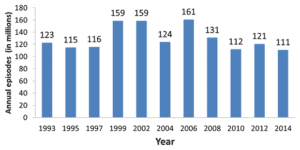Most drugs fall into one of two categories: “uppers” or “downers”. Referring to the physical and mental reactions a user experiences while intoxicated by a specific substance, these physiological experiences manifest in different ways. As stimulants, uppers produce an increase in energy, feelings of invincibility, and sharpened focus while downers act as depressants, inducing lethargy, feelings of euphoria, and relief from discomfort.
Yielding opposite effects, both uppers and downers are equally capable of inflicting damage to the user. Complications associated with uppers include rapid heart rate, high blood pressure, and aggression whereas downers contribute to breathing suppression, low blood pressure, and impairment of motor skills.

Is Alcohol an Upper or Downer?
Alcohol is a Central Nervous System depressant, classifying it as a downer. Due to its legality and accessibility, alcohol is considered the most addictive and abused substance in the world. According to the Centers for Disease Control and Prevention, approximately 95,000 deaths each year are attributed to alcohol consumption. These fatalities include alcohol-induced traffic accidents, liver failure, and alcohol poisoning, among others.
Side Effects of Alcohol Use
Reactions from alcohol consumption happen within minutes and can last for many hours. These side effects include:
Impaired motor functioning
Slurred Speech
Dizziness
Suppressed breathing
Drowsiness
Impaired Judgment
When ingested in excess, the body interprets alcohol as a poison, resulting in the possibility of experiencing the following adverse reactions:
Vomiting
Unconsciousness
Liver damage
Stroke
Seizure

Dangers of Alcohol Abuse
Excessive or prolonged drinking carries negatively affects the body in many ways. As a depressant, alcohol toxicity suppresses breathing which, in turn, reduces oxygen supply to vital organs significantly. The brain is particularly vulnerable to alcohol abuse. Excessive and prolonged alcohol intake deplete’s the brain’s thiamine supply resulting in Wernicke-Korsakoff Syndrome, or “wet brain”. As stated in a publication by the National Institute on Alcohol Abuse and Alcoholism, symptoms of this disorder include mental confusion, paralysis of the nerves that move the eyes, difficulty with muscle coordination, and persistent learning and memory problems.
The liver is also extremely susceptible to damage caused by alcohol abuse as it is responsible for the metabolization of alcohol within the body. The three forms of liver disease attributed to excessive alcohol consumption are fatty liver, hepatitis, and cirrhosis. According to the Cleveland Clinic, Cirrhosis causes about 26,000 deaths each year in the U.S. and is the seventh leading cause of death in the U.S. among adults 25 to 64 years of age.
Although severe disorders can develop through heavy, prolonged alcohol consumption, impaired driving while under the influence is the leading cause of alcohol-related fatalities. The Centers for Disease Control and Prevention report that 29 people in the United States die each day in motor vehicle crashes that involve an alcohol-impaired driver. The graph below displays the significance alcohol plays in traffic accidents.
Annual Self-reported Alcohol-impaired Driving Episodes among U.S. Adults, 1993-2014

Asheville Recovery Center Can Help
Alcohol is a highly addictive depressant with the potential to inflict long-term damage to the body when abused. It is important to seek help immediately if you or a loved one is struggling with this addiction. At Asheville Recovery Center, one of the premier alcohol treatment centers in North Carolina, treatment specialists have developed a unique, hybrid model of treatment which combines a traditional 12-step program with holistic rehabilitation. A multitude of services, programs, and therapies are offered, including the Partial Hospitalization Program, Residential-style treatment, outpatient rehabilitation, and more.
The founders of Asheville Recovery Center, as well as many of our addiction therapists, have struggled with addiction and now enjoy life in recovery. They understand the struggles of addiction and how difficult it is to overcome alone. As the best alcohol treatment NC has to offer, we are ready and eager to help. If you feel that you or a loved one is struggling with substance abuse, our specialists are on standby and ready to help. Call (828)518-6996 and speak with an addiction expert today so you can take the first step towards a rewarding life of sobriety.






